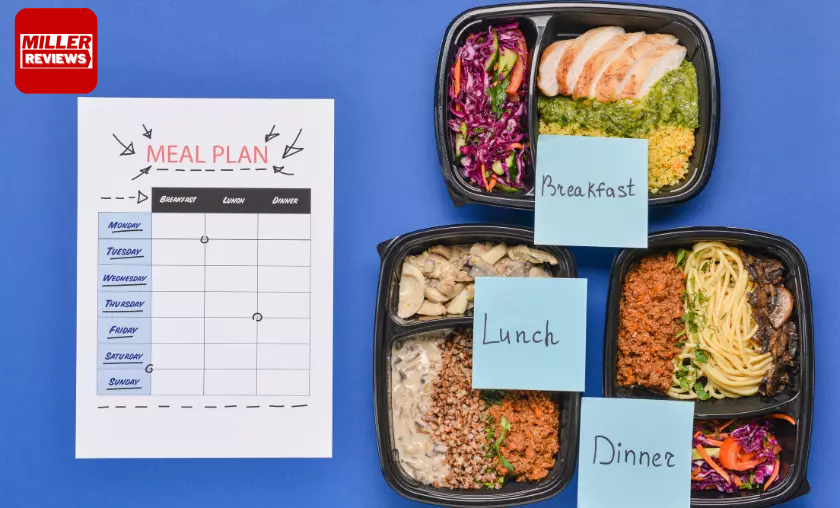Meal planning on a budget is an absolutely genius strategy that can help you reclaim your precious time and hard-earned cash for grocery shopping. And let’s remember the fact that it ensures you never have to compromise on scrumptious, nourishing meals for the entire week. But, let’s face it, maneuvering through the art of meal planning while staying within a tight budget can be quite the hurdle.
However, fear not, for in this captivating article, we shall unveil the unparalleled masterpiece that is the ultimate guide to budget-friendly meal planning.
Table of Contents
Brace yourself for an extraordinary journey as we dive into expert tips and tricks for planning, shopping, and cooking. Prepare to conquer the world of meal planning on a budget like a true culinary virtuoso!
Meal Planning is Becoming Increasingly Popular

Can we take a moment to appreciate the absolute craze that is meal planning? It’s like the hottest thing right now and for good reason! People are finally waking up to the incredible benefits of eating healthier, saving those precious dollars, and minimizing the dreaded food waste. Hold on to your hats because I’ve some mind-blowing statistics for you.
Brace yourself! According to the International Food Information Council, a staggering 84% of those surveyed reported whipping up delicious homemade meals at least once a week. But wait, it gets even better! Are you ready for this? A whopping 43% of these amazing individuals actually plan their meals in advance. Can you believe it? It’s a whole new world, my friend and meal planning is leading the way like an absolute superstar!
Meal Planning Has Many Benefits, Including:
- Saving Money: Meal planning is a great way to save money on groceries by preventing impulse purchases and utilizing ingredients you already have.
- Reducing Food Waste: Planning meals helps you save money by reducing food waste and utilizing ingredients before spoiling.
- Eating Healthier: With meal planning, you can enjoy a balanced and nutritious diet, avoiding reliance on takeout or processed foods.
- Saving Time: Meal planning saves you time by minimizing grocery store trips and eliminating the need to decide what to cook for dinner each day.
Given its benefits, meal planning is a popular strategy for those seeking a healthy diet, savings, and reduced food waste.
The Meal Planning on a Budget
The 1st Step is Planning

1. Set a Budget
When meal planning on a budget, begin by establishing a spending limit. Assess how much you can feasibly allocate to groceries weekly or monthly, and structure your meal plans accordingly. This ensures adherence to your budget and prevents unnecessary expenditures.
2. Plan Ahead
To optimize your budget and prevent impromptu grocery runs, it’s best to plan your meals in advance, ideally for a week or longer. Employ a meal planning template or app to structure your meals and consider any specific dietary needs or preferences. This way, you can make the most of your resources efficiently.
3. Use Sales and Coupons
Before meal planning, explore your local grocery store’s weekly ads and coupons to discover the current sales. Seek out discounts on fresh produce, meat, and pantry essentials, and incorporate them into your meal plans. Additionally, leverage online coupon websites and apps such as Ibotta and Checkout 51 to maximize your savings.
4. Buy in Bulk
Consider purchasing in bulk to save money on groceries, particularly for items like rice, pasta, and canned goods. Keep an eye out for bulk deals on these items and ensure proper storage to avoid spoilage. Buying in larger quantities can be a smart budget-friendly strategy.
5. Keep It Simple
Stick to simple, budget-friendly meals with readily available ingredients in your pantry. Steer clear of complex recipes that call for expensive or elusive ingredients and instead concentrate on incorporating affordable staples like beans, lentils, and grains. Keeping your meals straightforward and economical ensures both convenience and savings.
The 2nd Step is Shopping

1. Make a List
Compile a list of the necessary items for your meals and adhere to it while grocery shopping. This strategy prevents impulsive purchases and ensures you stay within your budget. You can shop with intention and financial discipline by sticking to your list.
2. Shop at Discount Stores
Discount stores like Aldi and Lidl are excellent options when shopping for groceries on a budget. These stores frequently provide lower prices on essential items such as milk, eggs, bread, fresh produce, and meat. Exploring these establishments can help you stretch your budget further while still obtaining quality ingredients.
3. Choose Generic Brands
Generic or store-brand products often match the quality of name-brand items while being more affordable. Seek out generic alternatives to your preferred products and compare prices to ensure optimal savings. Doing so lets you secure the best deal without compromising on quality.
4. Buy Seasonal Produce
Purchasing seasonal produce presents an excellent opportunity to save money on fresh fruits and vegetables. These items are typically more affordable in season and boast superior freshness and flavor. Embracing seasonal options is a smart strategy for both your wallet and taste buds.
5. Avoid Processed Foods
Processed foods tend to be pricier compared to whole, unprocessed alternatives. Furthermore, they lack nutritional value and satiety. Rather than investing in packaged snacks and meals, prioritize whole foods such as fruits, vegetables, and whole grains. This choice supports both your health and your budget.
The 3rd Step is Cooking

1. Cook in Bulk
Preparing meals in large quantities can be a time and money-saving technique, particularly when faced with a hectic schedule. Cook substantial batches of food and freeze them for future consumption. Doing so lets you bypass costly takeout or dining-out options during busy evenings. Embracing bulk cooking ensures convenience and financial prudence.
2. Use Leftovers
Leftovers serve as an excellent meal resource throughout the week. Strategically plan meals that can be repurposed, such as roasted chicken or a hearty pot of chili. Utilize leftovers for lunches or transform them into new dishes by incorporating fresh ingredients. Leveraging leftovers reduces waste and provides convenient and versatile meal options.
4. Cooking from Scratch
Preparing meals from scratch is an excellent budget-friendly approach to meal planning. Not only is it more economical than purchasing pre-made or processed foods, but it also offers superior health benefits and satisfaction. Cooking from scratch grants, you control over the ingredients and allows for recipe adjustments to suit your preferences. Moreover, it presents an enjoyable and imaginative opportunity to explore new flavors and cuisines. Consider incorporating homemade dishes to enhance your menu when planning your next meals.
Seasonal Meal Planning

To embark on seasonal meal planning, commence by researching which produce thrives in your region during specific times of the year. This information varies depending on your location and the season. However, each season generally offers an assortment of fruits and vegetables at its prime. For instance, summer prompts meal planning around tomatoes, zucchini, cucumbers, and berries, while fall calls for a focus on squash, apples, pears, and root vegetables.
Once you’ve identified the in-season produce, seek out recipes that showcase those ingredients. Numerous online resources, including blogs and recipe websites, furnish a wealth of seasonal recipes to inspire your culinary endeavors. Also, feel free to experiment with your recipes and venture into new flavor combinations using the seasonal bounty.
To maximize savings, contemplate buying produce in bulk when it’s in season and preserving or freezing it for later use. For instance, purchasing a substantial quantity of tomatoes during summer allows you to create sauces or soups that can be frozen and enjoyed throughout the year.
What to Do When Meal Planning is Too Challenging

Meal planning can indeed present challenges, particularly when juggling a busy schedule or needing more culinary expertise. However, there are effective strategies to simplify and manage the process.
- Firstly, start small by focusing on planning just a few days’ worths of meals instead of the entire week. This approach reduces overwhelm and allows for adjustments if necessary.
- Secondly, leverage meal planning apps or websites to streamline the process. Numerous free online tools can assist in creating customized meal plans and generating grocery lists based on your preferences and dietary requirements.
- Thirdly, prioritize simplicity in your meal choices. Elaborate meals every day are unnecessary. Stick to recipes that are straightforward to prepare, utilizing familiar ingredients.
- Fourthly, embrace the concept of leftovers. Cook larger portions and repurpose them for the following day’s lunch or dinner. This practice saves both time and money while minimizing food waste.
- Lastly, be kind to yourself. Meal planning is a skill that requires practice and patience. If a week doesn’t go as planned, don’t give up. Learn from the experience and keep striving.
Remember, meal planning is an excellent way to save money and enhance your diet, but it can be something other than flawless. Utilize these tips to simplify and manage the process while relishing the joy of cooking and exploring new recipes.
Conclusion
“The Ultimate Guide to Meal Planning on a Budget” serves as a comprehensive resource to empower you on your journey towards cost-effective meal planning. By applying the strategies and tips provided, you can take charge of your grocery budget, reduce food waste, and cultivate a healthier eating routine. Remember, meal planning is a skill that improves with time and practice.
Be patient with yourself, embrace flexibility, and enjoy the process of creating nourishing and affordable meals for yourself and your loved ones. With this guide as your companion, you’re well-equipped to embark on a budget-friendly meal-planning adventure.
FAQs
How Can I Set a Realistic Budget for Meal Planning?
To set a realistic budget for meal planning, start by assessing your monthly income and expenses. Determine how much you can allocate to groceries, taking into account other essential expenses.
Aim for a budget that allows you to meet your nutritional needs while still saving money. Track your spending & adjust your budget as needed to find the right balance.
What Are Some Strategies for Finding Affordable Ingredients?
There are several strategies to find affordable ingredients. First, check local grocery store flyers, ads, and coupons to take advantage of sales and discounts. Discount stores and farmer’s markets can also offer competitive prices on fresh produce.
Consider buying in bulk for pantry staples like rice, pasta, and canned goods, as they are often cheaper in larger quantities.
How Can I Make the Most of Seasonal Produce in My Meal Planning?
Making the most of seasonal produce starts with researching what’s in season in your area. Look for local farmer’s markets or grocery stores that offer seasonal produce at a lower cost. Plan meals around these ingredients to enjoy their freshness and flavor while supporting local agriculture.
You can also buy seasonal produce in bulk and freeze or preserve it for later use, extending its availability beyond its season.
Is It Possible to Eat Healthily on a Budget?
Absolutely! Eating healthy on a budget is achievable with strategic meal planning. Focus on whole foods like vegetables, fruits, lean proteins, and whole grains. Avoid processed and pre-packaged foods, as they are often more expensive and less nutritious.
You can create balanced and nourishing meals without breaking the bank by cooking from scratch and utilizing affordable ingredients like beans, lentils, and grains.
For More amazing articles related to Health Check out our website Over Here
To Read more similar articles click here
Thanks for visiting our Website. If you appreciate our work, kindly show us some support in our comments section 🙂